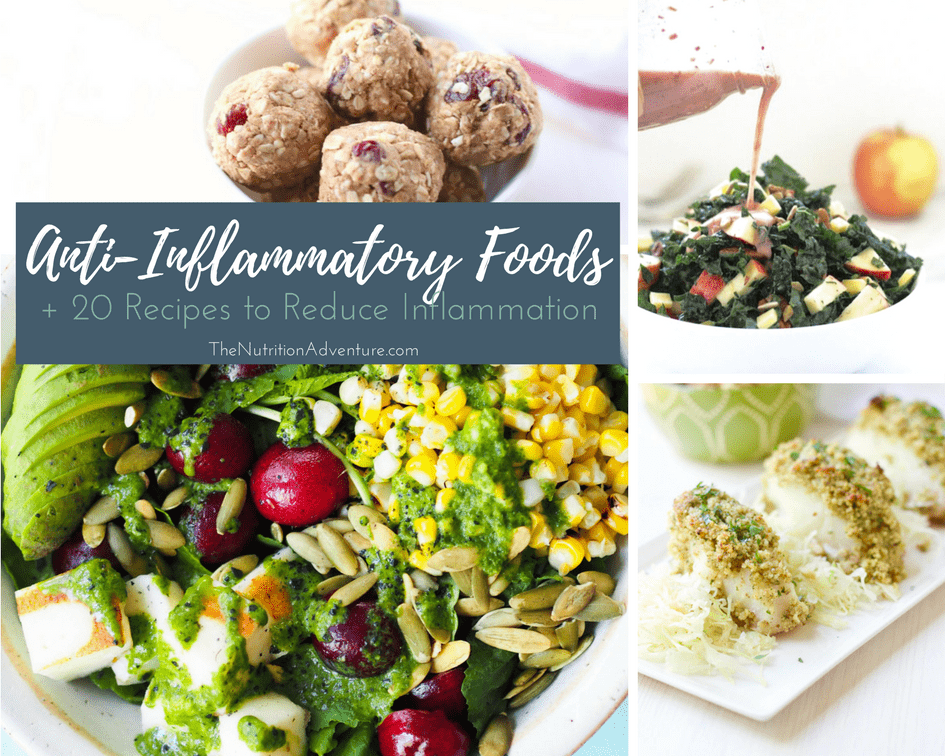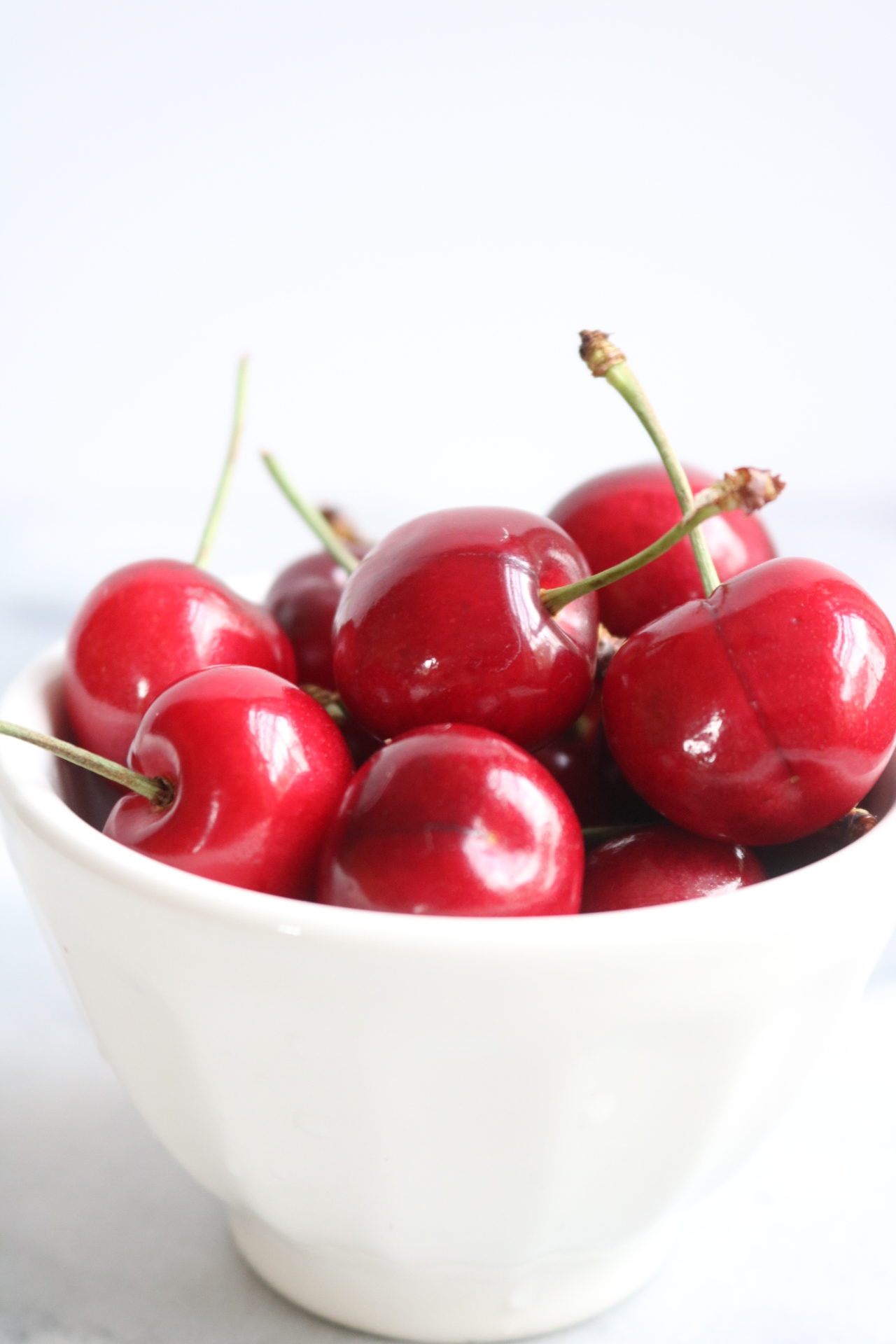Learn what causes inflammation, how it affects your health, and how to fight it with anti-inflammatory foods. Plus, 20 Recipes to Reduce Inflammation!

This post about anti-inflammatory foods has been in the works for quite some time, so I’m happy to finally share it with you! As I started writing about this topic, I realized putting all of the information about inflammation, the causes, and how to reduce it, was a bit overwhelming for one blog post. So, I’m breaking this topic down into two different posts! Be sure to sign up for my email list so you don’t miss out on the next post in this series about ways to reduce inflammation beyond eating anti-inflammatory foods.
What Causes Inflammation?
When you hear the word inflammation, you may automatically think it’s a bad thing. But sometimes, inflammation is necessary and can help protect our bodies! A good example of this would be if you were to get a cut on your finger. Your body responds by sending antibodies to the affected area to help protect it and fight off infection. This would be an example of acute inflammation, and it eventually goes away once the body has healed.
If inflammation becomes chronic, that’s when issues may start to arise. Autoimmune diseases, like Celiac’s disease, can lead to chronic inflammation as well as prolonged stress, and a diet high in processed sugar and high-fat foods.
How Does Chronic Inflammation Affect My Health?
Chronic inflammation can have negative, long-lasting impacts on the body and can even lead to certain diseases. When the body experiences inflammation for an extended period of time, the digestive tract, joints, heart, and even dental health can suffer.
The good news is that we can reduce inflammation in several ways, one of them being the foods we choose to eat!
[bctt tweet=”The good news is that we can reduce inflammation in several ways, one of them being the foods we choose to eat! Learn more + get 20 Recipes to Reduce Inflammation ” username=”KarmanRD”]
Anti-Inflammatory Foods

Fruits and Vegetables
Chalk up another health benefit to fruits and vegetables! The antioxidants found in produce can help reduce cell damage and prevent inflammation. Anthocyanins, the beneficial plant pigment that gives certain fruits and vegetables their deep purple, red, or blue color, has been linked to fighting inflammation, improved cardiovascular health, and reducing the risk of dementia.
Foods such as cranberries, blueberries, blackberries, cherries, and red cabbage are rich in anthocyanins.
Research has also shown that dark, leafy green vegetables like kale, broccoli, spinach, and cabbage can help fight off inflammation in the body. How do they do it? Dark, leafy greens contain lots of vitamin K, which reduces proteins in the blood that can lead to inflammation.
Fish
You may already be aware that fish such as salmon, mackerel, tuna, and sardines are good sources of omega-3 fatty acids, which is important for heart and brain health. But did you know omega-3 fatty acids have anti-inflammatory properties? Try to include at least two servings of these cold-water fish into your diet each week.
Nuts
Nuts such as almonds, walnuts, pistachios, and even pine nuts, contain high levels of vitamin B6, which has been correlated with lower inflammatory disease risk. They’re also a great way to get the healthy and essential monounsaturated fats our bodies require. Bring on the healthy fats!
Beans
Beans contain fiber, phytonutrients, and antioxidants, all of which can help fight inflammation. Whether it’s kidney beans, garbanzo beans, pinto beans, or white beans, try adding beans to salads, dips, and soups, like this Crockpot Vegetable & White Bean Soup. For convenience, I use canned beans when cooking and just make sure I rinse them well before using to help reduce the sodium content.
Whole Grains
Since fiber can help lower inflammatory indicators in the blood, whole grains such as bread made with whole wheat flour, oatmeal, brown rice, quinoa, and bulgur should be included in the diet on a daily basis. Breads, cereals, and other refined grains are often lacking in fiber and may contain processed sugars, so they should be limited. When shopping for whole-grain breads, be sure to read the ingredient list to make sure “whole wheat flour” is listed as the first ingredient and look for breads that provide 5 grams or more of fiber per serving.
Turmeric, Cinnamon & Ginger
Even spices like turmeric, cinnamon, and ginger can help reduce inflammation. While taking a capsule form of each of these spices is an option, I recommend and prefer to include them in food. Turmeric lattes have become really popular recently, but you can also make a delicious and simple hot tea by heating a mug of water and adding a pinch of turmeric, cinnamon, and ginger, plus a touch of honey. Add a dash of cinnamon to your morning oatmeal or add in fresh ginger to stir-fry dishes and smoothies!
Anti-Inflammatory Recipes
From breakfast to dinner, to snacks in between, each of the recipes below includes at least one anti-inflammatory food. Thanks to my dietitian-food blogger friends who shared their best inflammation-fighting recipes for this post!
Smashed Chickpea Scramble from RDelicious Kitchen
Roasted Blood Orange Oatmeal from The Foodie Dietitian
Cauliflower Cranberry Superfood Salad from The Nutrition Adventure
Vegetarian Rice & Bean Casserole from Make Healthy Easy
Fennel, Apple, & Red Cabbage Slaw with Creamy Maple Lemon Tarragon Dressing from EA Stewart
Spicy Southwest Sardine Bites from Nutrition Starring You
Sheet Pan Salmon & Vegetables from The Nutrition Adventure
Quinoa Oatmeal with Berries from RDelicious Kitchen
Crispy Walnut Cod with Walnut Tzatziki from Marisa Moore Nutrition
Date & Nut Power Bars from Jenny Shea Rawn
Baby Kale and Cherry Salad with Grilled Halloumi from Rachel Hartley Nutrition
Black Bean Hummus from The Nutrition Adventure
3 Bean Avocado Salad with Lime Dressing from Nutrition Starring You
Cherry Almond Energy Bites from Marisa Moore Nutrition
Cherry Mint Salsa from Your Choice Nutrition
Banana Ginger Oats from Champagne Nutrition
Kale Apple Salad with Cranberry Vinaigrette from Craving Something Healthy
Black Forest Smoothie Bowl from RDelicious Kitchen
Cranberry Walnut Cookie Overnight Oats from Jenny Shea Rawn
Balsamic Roasted Brussels Sprouts with Toasted Walnuts from Marisa Moore Nutrition
Don’t forget to sign up for my email newsletter so you don’t miss the next post about fighting inflammation! Leave me a comment below if you have questions about eating to reduce inflammation or just let me know if you enjoyed reading this post! I appreciate the feedback 🙂